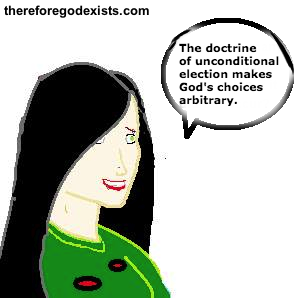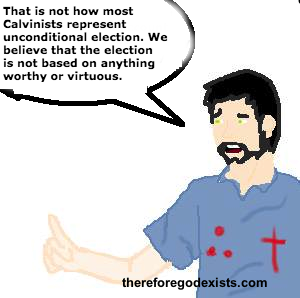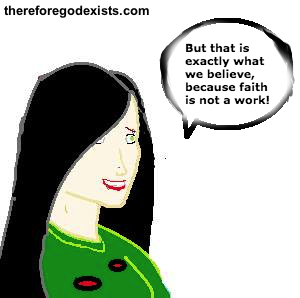 Unconditional election is the doctrine that God sovereignly chooses who will be saved and passes over others. Imagine that all of the tenants of a building gambled away their rent money. They all deserved to be evicted. If the landlord evicted everybody, nobody would condemn him. He was perfectly within his rights. However, suppose that the landlord had immeasurable wealth and would not suffer any financial ruin if he were to pay for the debts of all of his tenants. Would he be under any ethical obligation to pay for their debts? Unless you supported the presidential campaign of Bernie Sanders, then you will probably say that he does not. It is his money to do with as he pleases. But suppose the landlord is also a very merciful man, and he wants to pay for their debt. If he paid for all of their debts, they would think that there were no consequences for their actions.
Unconditional election is the doctrine that God sovereignly chooses who will be saved and passes over others. Imagine that all of the tenants of a building gambled away their rent money. They all deserved to be evicted. If the landlord evicted everybody, nobody would condemn him. He was perfectly within his rights. However, suppose that the landlord had immeasurable wealth and would not suffer any financial ruin if he were to pay for the debts of all of his tenants. Would he be under any ethical obligation to pay for their debts? Unless you supported the presidential campaign of Bernie Sanders, then you will probably say that he does not. It is his money to do with as he pleases. But suppose the landlord is also a very merciful man, and he wants to pay for their debt. If he paid for all of their debts, they would think that there were no consequences for their actions.  So instead, he chooses to pay for only some of their debts. That is what is stated by the doctrine of unconditional election. God chooses to pay for the debts of some of his people. However, in response, some will raise the philosophical objection that when God choose individuals, his choice must be arbitrary. Is that the case? Is unconditional election a random, arbitrary election?
So instead, he chooses to pay for only some of their debts. That is what is stated by the doctrine of unconditional election. God chooses to pay for the debts of some of his people. However, in response, some will raise the philosophical objection that when God choose individuals, his choice must be arbitrary. Is that the case? Is unconditional election a random, arbitrary election?
Some regard this as a very powerful objection to the reformed confessions of faith. There seem to be two options. The first option, stated by Arminian theology is that election is based on conditions that individuals meet (namely, their faith apart from works). But the doctrine of unconditional election states that there are no conditions. If there are no conditions, then on what basis does God choose individuals? Would it not have to be random?
The Words ‘Unconditional Election’ Can Be Misleading
 Sometimes the definition of a word within the title of a doctrine can mislead people into following them to a logical conclusion. Consider the doctrine of total depravity. As Calvinists, we believe that man cannot do anything at all that is pleasing to God. He has a fallen nature and is totally depraved. But many Calvinist do not think that man is maximally evil. We hold a concept of common grace, whereby God restrains the evil hearts of men. So there may be times in which an unregenerate sinner exhibits self-sacrificial behavior solely for the good of others. But the title total depravity can mislead you into thinking otherwise. The same could be said of unconditional election.
Sometimes the definition of a word within the title of a doctrine can mislead people into following them to a logical conclusion. Consider the doctrine of total depravity. As Calvinists, we believe that man cannot do anything at all that is pleasing to God. He has a fallen nature and is totally depraved. But many Calvinist do not think that man is maximally evil. We hold a concept of common grace, whereby God restrains the evil hearts of men. So there may be times in which an unregenerate sinner exhibits self-sacrificial behavior solely for the good of others. But the title total depravity can mislead you into thinking otherwise. The same could be said of unconditional election.
 When the reformed confessions of faith state that God’s choosing of individuals is unconditional, that is to say that God did not perceive anything worthy in and of these individuals that would lead him to choose one over the other. Of the unconditional election of the elect, the Westminster Catechism says that it was “without any foresight of faith or works in man or perseverance in either of them.” (Chap. III, art. 3,4 &5; Chap. X, art. 2). As Dr. Sam Storms put it (read this, it is very good), “There is no distinction between elect and non-elect prior to the distinction that election makes.”
When the reformed confessions of faith state that God’s choosing of individuals is unconditional, that is to say that God did not perceive anything worthy in and of these individuals that would lead him to choose one over the other. Of the unconditional election of the elect, the Westminster Catechism says that it was “without any foresight of faith or works in man or perseverance in either of them.” (Chap. III, art. 3,4 &5; Chap. X, art. 2). As Dr. Sam Storms put it (read this, it is very good), “There is no distinction between elect and non-elect prior to the distinction that election makes.”
Dr. Storms also went on to point out that while election is not based on anything worthy in the individual, there are still factors and there is still a foundation for God’s decision. I think that it is the firm conviction of most reformed individuals that the confessions of faith that outline the doctrine of unconditional election merely inform us that God did not find anything worthy in his elect that would separate them from the non-elect. God had reasons of which we are unaware, but those reasons did not reside in the merit or worth or virtue of any of the individuals who he chose.
But It Is Still A Condition
If the Arminian is seeking merely to win an argument about the definition of the words of the title of the doctrine, then they might point out that whatever reasons God had would in fact be a condition. But as I pointed out, that would depart from how most reformed individuals interpret the Westminster Catechism and probably how the authors of the great reformed confessions of faith intended us to interpret it (for they did not believe that God’s election was arbitrary). I would prefer to have a discussion that allows both sides to define their own terms. When we say that election is unconditional, we mean that election is not based on anything meritorious or worthy that God finds in an individual.
But Faith Is Not Meritorious Or Worthy, Is It?
Throughout the New Testament, we see a stark distinction between faith and works. Paul often tells us that we are justified by faith alone and not by the works that we perform. Ipso facto, faith is not a work. It is not something that we present to God as some sort of meritorious deed in the hope that he will reward it with eternal life. It means only that we are trusting in God’s promises, and his promises cannot fail. But, if faith is not a work, then perhaps the Arminian could rejoin that my definition of unconditional election is indistinguishable from conditional election. I have stated that God has reasons for his election that are not in the virtue of the individual. If faith is not a work, then faith could qualify as one of those reasons.
While faith is often distinguished from works in the New Testament, it is undeniable that it is still a virtuous act. It is more virtuous to have faith than to be unfaithful. It is more virtuous to trust God’s promises than to walk in rebellion to one’s Creator. The doctrine of unconditional election states that God does not choose us on the basis of anything virtuous or worthy or meritorious. Again, if the Arminian were to take this position, then they would be arguing based on the definition of words rather than based on the definition of the theological position. If the Arminian were to use this as a basis for saying that they, too, believe in unconditional election, then they would be doing nothing more than muddying the waters, using a definition of unconditional election that departs from its’ historic and normal usage.
Is ‘I Don’t Know’ Always A Bad Answer?
There are many things in this life that we do not always have the answers to. Why is there so much evil and suffering in the world? We may be able to conjure up a few general theodicies. But why did this happen to me? Why did I stub my toe? Why did I get a flat tire? I want specifics! Give me an answer. Of course, there are no answers forthcoming in this life (or perhaps ever). But the fact that we do not have insight into God’s mind does not mean that we have given a poor answer. Sometimes the answer really is that we do not know because we cannot know it. God has not revealed why he chose one individual over another. He has only said that it has pleased him to save his elect.
Of course, to say that you do not know does not always function very well in the context of a debate. People want to have answers to these questions. They want to be satisfied. When the Arminian presses this point, insisting that divine election is either arbitrary or conditional, they are something like the man who is insisting upon knowing why he stubbed his toe. We do not always know what the ultimate, cosmic reasons are. It may not make for good debating and the answer may not always be satisfying. But sometimes we need to accept what God has revealed. This is the point that God made when he appeared to Job. Job replied, “Behold, I am insignificant; what can I reply to You? I lay my hand on my mouth.” (Job 40:4).
What If It Was Arbitrary?
In his article 5 Reasons To Reject Unconditional Election, Micah J. Murray pointed out that if God were to choose random people to salvation, then this would be capricious. God seems to be sending people to Hell for no reason. However, I think that this objection is misguided. If the choice of the elect were truly random, then he would be electing people to go to Heaven for no reason. People go to Hell for their sins against a holy and righteous God.
In these discussions, people tend the view the non-elect as poor, innocent bystanders who are being victimized by God’s wrath. If only they had the chance to be saved, then they would joyfully accept God’s promises. I think that this is a much more generous view of mankind than the Bible provides. Quoting the Psalms, Paul writes in Romans 3:10-12, “There is none righteous, not even one. There is none who understands. There is none who seeks for God. All have turned aside. Together they have become useless. There is none who does good. There is not even one.” We are all like the tenants who gambled away their rent money. We are fools, haters of God and lovers of sin. Given the opportunity, the unregenerate man would always choose sin and would never choose righteousness. That is why the gospel is such a powerful message. Even when we were dead in our sins, God made us alive in Christ (Ephesians 2:5).
The building owner could randomly choose some people and cover their rent, while evicting everybody else, and this would not be capricious. He would be perfectly within his rational rights to do so. While the image of God reaching into a hat and selecting random names on a slip of paper is a caricature in the highest degree, it would not be capricious. So, even if we were to charitably grant the Arminian argument and say that God’s choice truly was arbitrary, it would not do anything to impugn the character of God or the doctrine of unconditional election.
Is Unconditional Election A Random, Arbitrary Election?
These discussions are often focused too heavily on the technical definitions of the title of the words in the doctrine. But I think that this is a mistake. When scientists tell us that there was a Big Bang, they generally do not mean that there was an explosion or an actual banging noise. It also was not very big. It was probably smaller than a grain of sand. Similarly, if a Calvinist tells you that man is totally depraved, it does not mean that man cannot do any good works at all. It means that he cannot do anything that is pleasing to God. He cannot justify himself before a holy God. The same principle can be applied to the doctrine of unconditional election.
We interpret the biblical data and the reformed confessions of faith concerning the doctrine of unconditional election to mean that God did not see anything meritorious in us that caused him to choose us. There are reasons, but we just do not know them, and that should not bother us. Accordingly, his choice was not random. But even if it were, that would not make him capricious anymore than it would make the building owner capricious for randomly selecting some of his tenants and paying their rent.